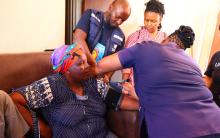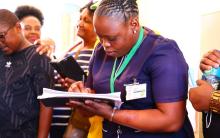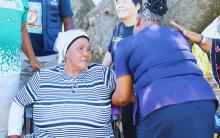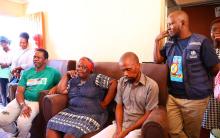WHO South Africa Supports National Campaign to Combat Non-Communicable Diseases
South Africa is facing a significant health challenge as Non-Communicable Diseases (NCDs) are on the rise. In response, the National Department of Health (NDoH) launched a national campaign to raise awareness and promote prevention and control measures for NCDs. The first event was held in KwaZulu-Natal, focusing on one of the subdistrict of iLembe. This launch marked the beginning of a series of activities planned as part of the campaign to reach communities across the country. With technical and financial support from the World Health Organization (WHO) South Africa, the campaign aims to address the growing burden of NCDs and improve public health outcomes in the country.
To this effect, the national campaign was officially launched by the Deputy Minister of Health, Dr Sibongiseni Dhlomo, on 1 March 2024, to educate the public about the risks and preventive measures for NCDs, empower individuals to make informed health decisions, and mobilize communities to act against NCDs. The launch was eventful, marked with a briefing, community visits to families suffering from various NCD’s and aerobic exercises.
During the community visits representatives from the NDoH, WHO, and other partners had the opportunity to meet with community members with NCDs, to understand the challenges they face. Amongst the community members visited, the Shezi family stood out. Being in the Shezi home underscored the commitment of the NDoH and WHO South Africa to ensure the right to health and access to health services for all members of the community.
The Shezi family's story is a poignant example of the impact of NCDs on individuals and families in South Africa. The daughter suffers from kidney failure, while the mother battles with diabetes and hypertension. Despite these challenges, the family has shown remarkable resilience and resourcefulness. The daughter, in particular, with the support of a community health worker improvised a home-based dialysis kit using readily available items, showcasing the strength and determination of individuals facing NCDs. The Shezi family's experience also highlighted the crucial role of community health workers in providing support and care, even in the face of limited resources. Their dedication and compassion have made a significant difference in the lives of the Shezi family and others in similar situations. Moved by the Shezi family's plight, and those of other community members, the NDoH and partners took immediate action during the visit and donated glucometers and food packages to support the families' health needs. This gesture underscored the commitment to providing tangible support to those affected by NCDs.
During the visit, it was insightful to learn that traditional health practitioners in the community have also been trained to test for NCDs and blood glucose levels. This initiative aims to ensure that a wider range of health professionals are equipped to detect and manage NCDs in the community. The visit to the Shezi family was a powerful reminder of the impact of NCDs on individuals and families in South Africa, as it also highlighted the importance of community-based care and the need for support and resources to address NCDs effectively. The NDoH and WHO remain committed to working together to improve the health and well-being of all South Africans affected by NCDs.
Following community visits, the campaign proceeded to an aerobics exercise session, which saw members of the community, the deputy minister and several partner organizations participating. The aerobic exercise session was in sync with the “5 x 5 NCD agenda”, which is an expanded approach by WHO to address NCD's more comprehensively. In summary, the WHO’s 5 x 5 campaign emphasizes a holistic strategy to combat NCDs, recognizing the interconnectedness of physical health, mental well-being, and environmental conditions.
Dr Dhlomo emphasized that NCDs contribute to a significant portion of all deaths in South Africa, with a high percentage being premature deaths (under 70 years of age). He stated these diseases not only impact the health and well-being of individuals but also have broader social and economic implications, including increased healthcare needs, lost productivity, and premature death, which hinder the country's progress towards social, health, and economic targets.
The collaboration between the NDoH and the WHO in this national campaign demonstrates a commitment to addressing the growing challenge of NCDs in South Africa. By raising awareness, empowering individuals, and mobilizing communities, the campaign aims to reduce the burden of NCDs and improve health outcomes for all South Africa.








